

The Blackphone Project. January 27, 2015 By Toby Weir-Jones How often have you given away your private information?
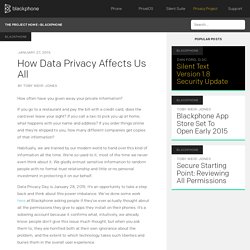
If you go to a restaurant and pay the bill with a credit card, does the card ever leave your sight? If you call a taxi to pick you up at home, what happens with your name and address? If you order things online and they’re shipped to you, how many different companies get copies of that information? Habitually, we are trained by our modern world to hand over this kind of information all the time. Data Privacy Day is January 28, 2015. Now look at your smartphone. What kind of story would that information tell about you? If you’re using a smartphone or similar device for both your personal and work activities, the risk is amplified. The ease of capturing and moving digital information has reduced the cost of collection, storage, and processing of our sensitive information to effectively almost zero. Tech Giants, Learning the Ways of Washington, Brace for More Scrutiny. In 2012, among other victories, the industry staved off calls for federal consumer privacy legislation and successfully pushed for a revamp of an obscure law that had placed strict privacy protections on Americans’ video rental records.

It also helped achieve a stalemate on a proposed global effort to let Web users limit behavioral tracking online, using Do Not Track browser settings. But this year is likely to put that issue in the spotlight again, and bring intense negotiations between industry and consumer rights groups over whether and how to allow consumers to limit tracking. Congress is likely to revisit online security legislation — meant to safeguard critical infrastructure from attack — that failed last year. And a looming question for Web giants will be who takes the reins of the Federal Trade Commission, the industry’s main regulator, this year. David C. At the end of 2012, tech companies were on track to have spent record amounts on lobbying for the year. 60 Minutes - Facebook. The Truth about Facebook! 10 Privacy Settings Every Facebook User Should Know.
We’ve updated this guide with the new privacy settings just launched by Facebook.
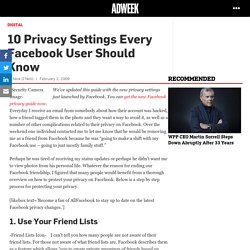
You can get the new Facebook privacy guide now. Everyday I receive an email from somebody about how their account was hacked, how a friend tagged them in the photo and they want a way to avoid it, as well as a number of other complications related to their privacy on Facebook. Over the weekend one individual contacted me to let me know that he would be removing me as a friend from Facebook because he was “going to make a shift with my Facebook use – going to just mostly family stuff.”
Perhaps he was tired of receiving my status updates or perhaps he didn’t want me to view photos from his personal life. Whatever the reason for ending our Facebook friendship, I figured that many people would benefit from a thorough overview on how to protect your privacy on Facebook. 1. Privacy Center. There are many different ways you can use our services – to search for and share information, to communicate with other people or to create new content.
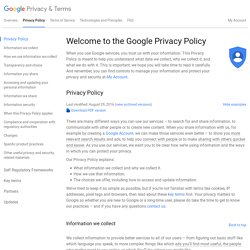
When you share information with us, for example by creating a Google Account, we can make those services even better – to show you more relevant search results and ads, to help you connect with people or to make sharing with others quicker and easier. As you use our services, we want you to be clear how we’re using information and the ways in which you can protect your privacy. Our Privacy Policy explains: What information we collect and why we collect it. How we use that information. We’ve tried to keep it as simple as possible, but if you’re not familiar with terms like cookies, IP addresses, pixel tags and browsers, then read about these key terms first. Internet privacy. Internet privacy involves the right or mandate of personal privacy concerning the storing, repurposing, provision to third-parties, and displaying of information pertaining to oneself via the Internet.
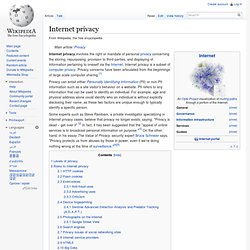
Internet privacy is a subset of computer privacy. Privacy concerns have been articulated from the beginnings of large scale computer sharing.[1] Privacy and the Internet: Traveling in Cyberspace Safely. Copyright © 1995 - 2014Privacy Rights Clearinghouse Introduction Introduction As consumers increasingly go online in so many aspects of their daily lives, the challenge is enjoy the conveniences of online activities while limiting the privacy sacrifices.
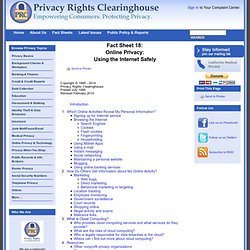
As the focus of online activity migrates from desktop and laptop computers to smartphones and other mobile devices, the mechanisms for protecting your privacy continue to evolve. Most internet users would like to be anonymous online, but many think it is not possible to be completely anonymous online. Privacy, Facebook and the Future of the Internet.
Today is the 3rd annual international Data Privacy Day and a whole bunch of companies are listed on the organization's website as participants.
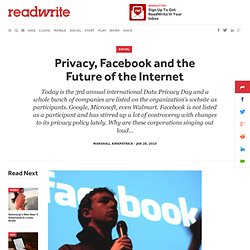
Google, Microsoft, even Walmart. Facebook is not listed as a participant and has stirred up a lot of controversy with changes to its privacy policy lately. Why are these corporations singing out loud about protecting our personal privacy? According to the website, "Data Privacy Day is an international celebration of the dignity of the individual expressed through personal information. " More than dignity, this is about building trust with consumers so that these companies can do things with our personal data.